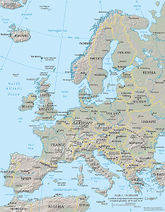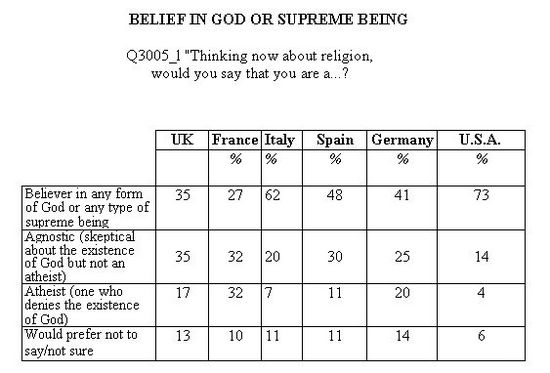Global Agnosticism
 From Conservapedia
From Conservapedia 
In 2015, Pew Research indicated in their report The Future of World Religions: Population Growth Projections, 2010-2050 that agnostics and atheists “will make up a declining share of the world’s total population.”[3]
The Center for the Study of Global Christianity (CSGC) at Gordon-Conwell Theological Seminary estimated that agnostics made up about 12.8% of the global adult population in 2015. CSGC projects that agnostics will makeup about 11.5% of the global adult population in 2025 and 9.1% of the global adult population in 2050.[4]
Secular Europe has one of the highest rates of agnosticism rates in the world. In 2014, the Pew Research Forum indicated that Europe will go from 11% of the world's population to 7% of the world's population by 2050.[5]
The agnostic Eric Kaufmann is a professor of politics at Birkbeck, University of London and author. His academic research specialty is how demographic changes affect religion/irreligion and politics.
Kaufmann wrote in 2010:
| “ | Worldwide, the march of religion can probably only be reversed by a renewed, self-aware secularism. Today, it appears exhausted and lacking in confidence... Secularism's greatest triumphs owe less to science than to popular social movements like nationalism, socialism and 1960s anarchist-liberalism. Ironically, secularism's demographic deficit means that it will probably only succeed in the twenty-first century if it can create a secular form of 'religious' enthusiasm." [6] | ” |
According to the agnostic scholar Kaufmann, in the Europe of tomorrow, immigration and religious fertility will increase the proportion of committed Christians in Europe, many from the developing world.[7]
For additional information, please see: Desecularization
Contents
Frequency of agnosticism in Western World Countries[edit]
Agnosticism has become a fairly common belief system in Western culture with 14% of people in the United States, 32% of people in France and 35% of people in Great Britain self-identifying as agnostics.[8]
Europe and agnosticism statistic[edit]
See also: Secular Europe
According to a poll measuring religious identification in the European Union in 2012 by Eurobarometer, 16% identify as non-religious/agnostic and 7% of EU citizens identify as atheists.[9][10]
The 2010 eurobarometer poll found that on total average, of the EU27 population, 51% "believe in a God", 26% believe in "some sort of spirit or life force" and 20% had neither of these forms of belief.[11]
World agnosticism map[edit]
See also[edit]
Notes[edit]
- ↑ 10 projections for the global population in 2050 By Rakesh Kochhar, Pew Research Forum, February 3, 2014
- ↑ Shall the Righteous Inherit the Earth? Demography and Politics in the Twenty-First Century by Eric Kaufmann
- ↑ The Future of World Religions: Population Growth Projections, 2010-2050, Pew Research Forum
- ↑ Status of Global Christianity, 2015, in the Context of 1900–2050
- ↑ 10 projections for the global population in 2050 By Rakesh Kochhar, Pew Research Forum, February 3, 2014
- ↑ Shall the religious inherit the earth? - Eric Kaufmann
- ↑ Shall the Righteous Inherit the Earth? Demography and Politics in the Twenty-First Century by Eric Kaufmann
- ↑ http://www.harrisinteractive.com/news/allnewsbydate.asp?NewsID=1131
- ↑ Cultur de Europa
- ↑ Discrimination in the EU in 2012" (PDF), Special Eurobarometer, 383 (European Union: European Commission), p. 233, 2012, archived from the original (PDF) on 2012-12-02, retrieved 14 August 2013 The question asked was "Do you consider yourself to be...?" With a card showing: Catholic, Orthodox, Protestant, Other Christian, Jewish, Muslim, Sikh, Buddhist, Hindu, Atheist, and Non-believer/Agnostic. Space was given for Other (SPONTANEOUS) and DK. Jewish, Sikh, Buddhist, Hindu did not reach the 1% threshold.
- ↑ "Special Eurobarometer, biotechnology, page 204" (PDF). Fieldwork: Jan-Feb 2010.
Categories: [Agnosticism]
↧ Download as ZWI file | Last modified: 02/15/2023 20:49:43 | 92 views
☰ Source: https://www.conservapedia.com/Global_agnosticism | License: CC BY-SA 3.0
 ZWI signed:
ZWI signed:
 KSF
KSF